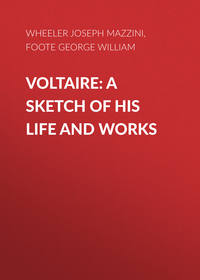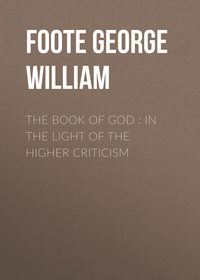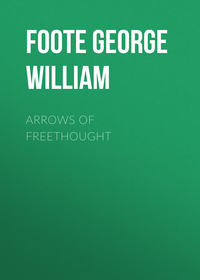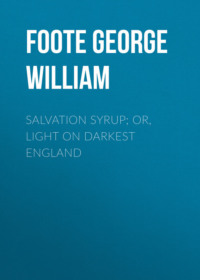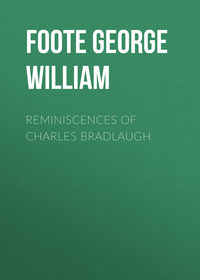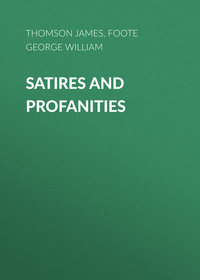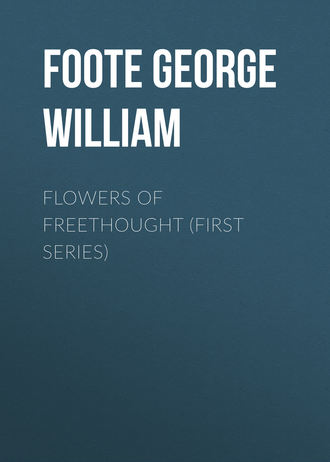 полная версия
полная версияFlowers of Freethought (First Series)
Tennyson's funeral took place at Westminster Abbey. The heads of that establishment, following the example set by Dean Stanley, now act as body-snatchers. They appropriate the corpses of distinguished men, whether they believed or disbelieved the doctrines of the service read over their coffins. Charles Darwin's body is buried there – the great Agnostic, who repudiated Christianity; Robert Browning's too – the poet who said "I am no Christian" to Robert Buchanan. Carlyle took care that his corpse should not join the museum. Tennyson's, however, is now in the catalogue; and, it must be admitted, with more plausibility than in the case of Browning – with far more than in the case of Darwin.
Christian pulpiteers, all over the country, have been shouting their praises of Tennyson as a Christian poet. They are justified in making the most of a man of genius when they possess one. We do not quarrel with them. We only beg to remark that they have overdone it. The Christianity of Tennyson is a very different thing from the Christianity they vend to the credulous multitude.
There is no real evidence that Tennyson accepted the legendary part of Christianity. Even in "In Memoriam," which was published forty-three years ago, the thought is often extremely Pantheistic. It is nearly always so in the later poems. God, not Christ, became more and more the object of the poet's adoration, "Strong Son of God, immortal Love" – the first line of tne earlier poem – does not necessarily mean Christ; while the exclamation, "Ring in the Christ that is to be," is more symbolic than personal. There is also a strong hope, rather than the certitude, of a future life. No thoroughly convinced Christian could have written of
The Shadow cloaked from head to foot,Who keeps the keys of all the creeds.Nay, the very deity of Christ is held loosely, if at all, in the thirty-third section, where he
Whose faith has centre everywhere,Nor cares to fix itself to form.is bidden to leave his sister undisturbed when she prays; the poet exclaiming
Oh, sacred be the flesh and bloodTo which she links a truth divine!In the last line of the next stanza this "sacred flesh and blood" of Christ (it is to be presumed) is called "a type" – which is a wide departure from orthodox Christianity. And what shall we say of the final lines of the whole poem?
One God, one law, one element,And one far-off divine event,To which the whole creation moves.Like other passages of "In Memoriam," it is a distinct anticipation of the thought of "The Higher Pantheism," "Flower in the Crannied Wall," "De Profundus," and "The Ancient Sage."
Much has been made of the "Pilot" in one of Tennyson's last poems, "Crossing the Bar."
I hope to see my Pilot face to faceWhen I have crossed the bar.This has been treated as a reference to Christ; but a friend of Tennyson's, writing in the Athenæum, says that the reference was really to the poet's son, Lionel Tennyson, who "crossed the bar" of death some years previously. How much more natural and human is the reference in the light of this explanation! Yet it appears, after all, from a later letter to the press by Tennyson's surviving son, that he did mean Christ. This is not, however, a confession of orthodoxy. The sentiment might be shared by men like the venerable Dr. Martineau, who deny the deity of Christ and strongly dissent from many time-honored Christian teachings.
Tennyson most assuredly revolted against the brutalities of Christianity; which, by the way, are countenanced by very explicit texts in the New Testament. He did not approve the text, "Great is your reward in heaven." He was above such huckstering. He sang of Virtue —
She desires no isles of the blest, no quiet seats of the just,To rest in a golden grove, or to bask in a summer sky.Give her the wages of going on, and not to die.A noble petition! though in the teeth of a too patent destiny.
The doctrine of eternal Hell he first turned from, then denounced, and finally despised. It was for wavering as to this hideous dogma that the Rev. F. D. Maurice got into trouble with his College. He was godfather to Tennyson's little boy, and the poet invited him, in exquisitely charming verse, to share his hospitality.
For, being of that honest few,Who give the Fiend himself his due,Should eighty-thousand college-councilsThunder "Anathema," friend, at you;Should all our churchmen foam in spiteAt you, so careful of the right,Yet one lay-hearth would give you welcome(Take it and come) to the Isle of Wight.Tennyson had already, in "In Memoriam," proclaimed himself a Universalist, as Browning did afterwards in his powerful lines on the old Morgue at Paris. He had expressed the hope
That nothing walks with aimless feet;That not one life should be destroyed,Or cast as rubbish to the void,When God hath made the pile complete;That not a worm is cloven in vain;That not a moth with vain desireIs shrivelled in a fruitless fire,Or but subserves another's gain.Such, a poet could never see the divinity of the wicked, awful words, "Depart from me, ye cursed, into everlasting fire." He denounced it in "Despair," a poem of his old age. Well does he make the Agnostic cry out to the minister —
What! I should call on thatInfinite Love that has served us so well?Infinite cruelty rather that made everlasting Hell,Made us, foreknew us, foredoomed us, and does what he will with his own;Better our dead brute mother who never has heard us groan!This is fierce denunciation, but it pales before the attack on Hell in "Rizpah"; that splendid poem, which is perhaps the very noblest effort of Tennyson's genius; outweighing hundreds of Balaclava charges and sea-fights; outshining the flawless perfection of "Maud": – a poem written in heart's blood and immortal tears, with a wondrously potent and subtle imagination, and a fire of humanity to burn up whole mountains of brutal superstitions.
The passionate words of the poor old dying mother, full of a deathless love for her boy who was hung, go straight as an arrow to its mark, through all the conventions of society and all the teachings of the Church.
Election, Election and Reprobation – it's all very well,But I go to-night to my boy, and I shall not find him in Hell.And if he be lost – but to save my soul, that is all your desire;Do you think that I care for my soul if my boy be gone to the fire?Tennyson gives the very essence of the moral revolt against Hell. Human nature has so developed in sympathy that the sufferings of others, though out of sight, afflict our imaginations. We loathe the spectacle of Abraham and Lazarus gazing complacently on the torture of Dives. Once it was not so. Those who were "saved" had little or no care for the "damned." But the best men and women of to-day do not want to be saved alone. They want a common salvation or none. And the mother's heart, which the creeds have trampled upon, hates the thought of any happiness in Heaven while son or daughter is agonising in Hell.
It is perfectly clear that Tennyson was far from an orthodox Christian. Quite as certainly he was not a Bibliolator. He read the Bible, of course; and so did Shelley. There are fine things in it, amidst its falsehoods and barbarities; and the English version is a monument of our literature. We regard as apocryphal, however, the story of Tennyson's telling a boy, "Read the Bible and Shakespeare; the one will teach you how to speak to God, and the other how to speak to your fellow-men." Anyhow, when the poet came to die, he did not ask for the Bible and he did ask for Shakespeare. The copy he habitually used was handed to him; he opened it at "Cymbeline," one of the most pagan of Shakespeare's plays; he read a little, and then held the book until Death came with the fall of "tired eyelids upon tired eyes."
It was a poetic death, and a pagan death. There lay the aged, world-weary poet; artificial light was withdrawn, and the moonlight streamed through the window upon his noble figure. Wife and son, doctors and nurses, were silent around him. And as Death put the last cold touch on the once passionate heart, it found him still clasping the book of the mighty magician.8 Let it be also noted that no Christian priest was at his bedside. He needed not the mum-lings of a smaller soul to aid him in his last extremity. Hope he may have had, but no fear. His life ended like a long summer day, slowly dying into night.
CHRIST'S OLD COAT
The little town of Trier (Treves) will soon wear a festive appearance. Pilgrims will be flocking to it from all parts of Germany, and God knows from where besides. Its handful of inhabitants have obtained licenses to open hotels and restaurants; every inch of available space has been let, so that whirligigs, panoramas, and menageries have to be refused the sites they apply for; every room in the town is to be let, more or less furnished; and not only is the tram company doubling its line, but the railway company is constructing special stations for special trains.
All this excitement springs from a superstitious source. After an interval of several years the Church will once more exhibit an old rag, which it calls the Holy Coat, and which it pretends is the very garment we read of in the Gospels. Such a precious relic is, of course, endowed with supernatural qualities. It will heal the sick, cure cripples, and, let us hope, put brains into idiotic heads. Hence the contemplated rush to Trier, where more people will congregate to see Christ's coat than ever assembled to hear him preach or see him crucified.
The pilgrims will not be allowed to examine the Holy Coat. Few of them, perhaps, would be inclined to do so. Thev have the faith which removes mountains, and swallowing a coat is but a trifle. Nor would the Church allow a close inspection of this curious relic, any more than it would allow a chemist to examine the bottle in which the blood of St. Januarius annually liquefies. The Holy Coat will be held up by priests at a discreet and convenient distance; the multitude of fools will fall before it in ecstatic adoration; and the result will be the usual one in such cases, a lightening of the devotees' pockets to the profit of Holy Mother Church.
According to the Gospels, the Prophet of Nazareth had a seamless overcoat. Perhaps it was presented to him by one of the rich women who ministered unto him of their substance. Perhaps it was a birthday gift from Joseph of Arimathaea. Anyhow he had it, unless the Gospels lie; and, with the rest of his clothes, it became the property of his executioners. Those gentlemen raffled for it. Which of them won it we are not informed. Nor are we told what he did with it. It would be a useless garment to a Roman soldier, and perhaps the warrior who won the raffle sold it to a second-hand clothes-dealer. This, however, is merely a conjecture. Nothing is known with certainty. The seamless overcoat disappeared from view as decisively as the person who wore it.
For many hundreds of years it was supposed to have gone the way of other coats. No one thought it would ever be preserved in a Church museum. But somehow it turned up again, and the Church got possession of it, though the Church could not tell now and when it was found, or where it had been while it was lost. One coat disappeared; hundreds of years afterwards another coat was found; and it suited the Church to declare them the same.
At that time the Church was "discovering" relics with extraordinary success and rapidity. Almost everything Christ ever used (or didn't use) came to light. His baby linen, samples of his hair and teeth, and the milk he drew from Mary's breast, the shoes he wore into Jerusalem, fragments of the twelve baskets' full of food after the miracle of the loaves and fishes, the dish from which he ate the last supper, the thorns that crowned his brow, the sponge put to his lips on the cross, pieces of the cross itself – these and a host of other relics were treasured at varions churches in Europe, and exhibited with unblushing effrontery. Even the prepuce of Jesus, amputated at his circumcision, was kept at Rome.
Several churches boasted the same articles. John the Baptist's body was in dozens of different places, and the finger with which he pointed to Jesus as his successor was shown, in a fine state of preservation, at Besancon, Toulouse, Lyons, Bourges, Macon, and many other towns.
John Calvin pointed out, in his grim Treatise on Relics, that the Holy Coat of Christ was kept in several churches. In our own time, a book on this subject has been written by H. von Sybel, who proves that the Trier coat is only one of twenty that were exhibited. All were authentic, and all were guaranteed by the same authority. Holy Mother Church lied and cheated without a twinge of compunction.
Nineteen Holy Coats have gone. The twentieth is the last of the tribe. While it pays it will be exhibited. When it ceases to pay, the Church will quietly drop it. By and bye the Church will swear it never kept such an article in stock.
Superstition dies hard, and it always dies viciously. The ruling passion is strong in death. A journalist has just been sent to prison for casting a doubt on the authenticity of this Holy Coat. Give the Catholic Church its old power again, and all who laughed at its wretched humbug would be choked with blood.
Protestants, as well as Freethinkers, laugh at Catholic relics. Were we to quote from some of the old English "Reformers," who carried on a vigorous polemic against Catholic "idolatry," we should be reproached for soiling our pages unnecessarily. John Calvin himself, the Genevan pope, declared that so many samples of the Virgin Mary's milk were exhibited in Europe that "one might suppose she was a wet nurse or a cow."
Freethinkers, however, laugh at the miracles of Protestantism, as well as those of the Catholic Church. They are all of a piece, in the ultimate analysis. It is just as credible that Christ's Coat would work miracles, as that Elisha's bones restored a corpse to life, or that Paul's handkerchiefs cured the sick and diseased. All such things belong to the same realm of pious imagination. Thus, while the Protestant laughs at the Catholic, the Freethinker laughs at both.
CHRIST'S COAT, NUMBER TWO
Jesus Christ is urgently required on earth again, to settle the pious dispute between Treves and Argenteuil as to which possesses the real seamless coat that was taken from him at the Crucifixion and raffled for by the Roman soldiers. No one but the second person of the Trinity, unless it be the first or third person of that three-headed monstrosity, is adequate to the settlement of this distracting quarrel. Even the Papacy, which represents the Holy Trinity on earth, is at variance with itself. Pope Leo favors Treves, and the wicked pilgrims who visit that little old town are to obtain absolution, if they do not forget to "pray for the extirpation of erroneous doctrines." Pope Pius, his predecessor, however, favored Argenteuil. A portion of the Holy Coat treasured in the church there was sent to him, and in return for the precious gift he forwarded a well-blessed and marvellously-decorated wax taper, which is still on show in a fine state of preservation.
When Popes differ, ordinary people, like pious Christians, and even the editors of Freethought journals, may be excused if they hesitate to commit themselves. One of these coats may be the true one, though the evidence is all against it, being in fact of such a shaky nature that it would hardly suffice to substantiate a claim to a bunch of radishes. But both of them cannot be authentic, and the problem is, which is the very coat that Jesus wore? Now it is obvious that no one – barring his two colleagues aforesaid – can possibly determine this question but himself. His re-appearance on earth is therefore most desirable; nay, it is absolutely necessary, unless a lot of people who would fain bow before the cast-off clothes of their Redeemer are either to stay at home in a state of dubiety or to incur the risk of kneeling before a mouldy old rag that perchance belonged to a Moorish slave or a Syrian water-carrier – in any case, to a dog of an infidel who spat at the very name of Christ, for such raiment was never worn by the worshippers of the Nazarene.
If Christ is coming to decide this great and grave problem, he will have to make haste, for Argenteuil is already on the war-path. Its Holy Coat is being exhibited before that of Treves, and thousands of pilgrims are giving Number Two the preference. Presently the Treves relic will attract its thousands, and the spectacle will be positively scandalous. Two Richmonds in the field were nothing to two Christ's Coats, each pretending to be the real article, and each blessed by a Pope. For the sake of decency as well as truth, Christ should peremptorily interfere. It is difficult to see how he can refrain. The Second Advent may therefore be expected before the date assigned by Prophet Baxter, and we shall probably soon hear the faithful singing "Lo he comes in clouds descending."
Why should he not come? we may ask the Catholics. His mother has often appeared, if we may believe the solemn affidavits of priests and bishops, backed up by the Holy See. Why should he not come? we may also ask the Protestants. His second coming is an article of their faith; it is plainly taught in the New Testament, and was recently propounded by Mr. Spurgeon as part of the irreducible minimum of the Christian faith. That he will come, then, may be taken for granted; and what better opportunity could be desired than the present? Surely the faithful, all over Europe – ay, and in America, to say nothing of Asia, Africa, and Australia – will cry like one man, "Come Lord Jesus, quickly come! Tell us, oh tell us, which of these mouldy old rags did once grace thy holy shoulders? Save us, oh save us, from the pain, the ignominy of adoring a dirty relic of some unknown sinner, who perhaps blasphemed thy holy name. Lighten our darkness, we beseech thee, O Lord!" Meanwhile we may point out that, if Christ does not come and adjudicate between Treves and Argenteuil, a multitude of Christians will certainly go on a fool's errand. Our private opinion is that all will do so who visit either or these places. Nevertheless they will no doubt congratulate themselves, if they go to Treves, on winning absolution. The Holy Father at Rome, who has a supernatural dispensing power, promises to wipe out the record of their sins. Liars, cheats, seducers, adulterers, and undetected assassins, may take a trip, perform genuflexions before something in a glass case, and return home with a clean record. Who can conceive an easier method of avoiding the consequences of wickedness? As for the prayer which the pilgrims are to offer up for "the extirpation of erroneous doctrines," it will cost them very little effort, for sinners who are washed clean with such delightful celerity are not likely to be in love with "erroneous doctrines" that declare the Pope's dispensing power a sham, and sternly tell men that the consequences of action, whether good or bad, are inevitable. We very much doubt, however, if "erroneous doctrines" will disappear through the prayers of the pilgrims or the curses of the Pope. Scepticism will probably gain by the spectacle of two rival Coats of Christ, both exhibited at the same time, both attracting crowds of devotees, and both enjoying the Papal blessing. It will bring superstition into still further contempt, and promote the rejection of a creed which has ever traded on ignorance and credulity.
SCOTCHED, NOT SLAIN
Those who have read the foregoing articles on the Holy Coat exhibitions at Treves and Argenteuil may think that enough space has been devoted to such a ridiculous subject. It is possible, however, that the present article will induce them to alter that opinion.
Hitherto we have treated this outburst of Christian superstition with jocosity, but there is a serious aspect of it which must not be neglected. Christianity has often made Freethinkers laugh, but not unfrequently it has made them weep tears of blood. Absurdity is not always a laughing matter. There was a comic side to the orthodox persecution of Charles Bradlaugh – but it killed him. Bigotry and superstition are fit subjects for jest and ridicule; when they gain power, however, they are apt to substitute agony for laughter. Celsus ridiculed Christianity in the second century; in the fourth his writings were absolutely destroyed, and those who shared his opinions, and dared to express them, were on the high road to the prison and the stake.
More recent events teach the same lesson. Thomas Paine treated Christianity not only with trenchant argument, but also with brilliant derision. For this he suffered ostracism and calumny, and for publishing the Age of Reason Richard Carlile, his wife, his sister, and his shopmen rotted in English gaols. The Freethinker derided Christian absurdities, and its conductors were sent to herd with criminals in a Christian prison. Nearly everyone thought, as Sir James Stephen declared in a legal text-book, that the Blasphemy Laws were obsolete; but it was proved by the inexorable logic of fact that laws are never obsolete until they are repealed. While the Blasphemy Laws exist they are always liable to enforcement. They are the standing menace of an absurd creed to those who smile at it too ostentatiously.
Let us extend the same line of reflection to this Holy Coat business. Contemptible as it is to the eye of reason, it excites the piety of millions of persons who never reasoned on religion in the whole course of their lives. Hundreds of thousands of men and women will visit these sham relics of a Savior whose own existence is open to dispute. Superstition will be stirred to its depths. The bestial instinct of spiritual slavery inherited from ancient semi-human progenitors will be intensely stimulated. The sacred function of priests will be heightened and intensified. Nor must it be forgotten that the pecuniary offerings of the pilgrims will fill the coffers of Holy Mother Church, who promises heaven to her dupes and seizes wealth and power for herself on earth.
Superstition is scotched, but not slain. It has life enough to be a peril to civilisation. The faith which wrecked "the grandeur that was Greece and the glory that was Rome" – the faith which buried the science, art, philosophy and literature of antiquity under a monstrous heap of brutal rubbish, out of which they were slowly and painfully excavated after the lapse of a thousand years – this same faith is still a danger to the highest welfare of mankind; to its reason, its conscience, its sense of dignity, and its spirit of brotherhood; above all, to freedom of thought, which is the sole guarantee of real and durable progress.
If we turn to Russia, we see at a single glance the fruits of superstition and its twin-sister tyranny. The Czar is the head of the Church and the head of the State; not like Queen Victoria, whose sacred function is only indicated in Latin on our coinage, but in literal, prosaic fact. By means of a swarm of ignorant, and often drunken and immoral priests, the masses of the people are kept in wretched subjection – hewers of wood and drawers of water, toilers for the huge army of officials, aristocrats, and princes – and conscripts for the army; while the best and noblest, in whom there still throbs the pulse of freedom, blacken the highways to the mines of Siberia, where hell is more than realised on earth, and the dreams of sour-blooded theologians are outdone in misery and horror.
Over the rest of Europe, even in France, the secular State is often as insecure as the footsteps of travellers over thin crusts of volcanic soil. Bismarck, the Titan, whose great work, with all its defects and failings, may appeal from the clamorous passing hour to the quiet verdict of history, only kept the Catholic Church and its Jesuits in check for a generation. He could not impair its vitality nor diminish its latent power. It is in Germany that the Coat of Christ is being exhibited, with priests and professors joining hands at the brazen ceremony of imposture; in Germany that myriads of pilgrims are wending their way to the shrine of an idolatry as ignominious as anything that Christianity ever supplanted.
Even in France the one great danger to the Republic is Christian superstition. It is the Church, her priests and her devotees, that furnish the real strength of every reactionary movement. That consummate charlatan, General Boulanger, took to going to church and cultivating orthodoxy when at the height of his aspiration for power. Happily he was defeated by the men of light and leading. Happily, too, the ablest and most trusted leaders of public life in France are on the side of Freethought. It is this, more than anything else, that makes the country of Voltaire the beacon of civilisation as well as the "martyr of democracy."


